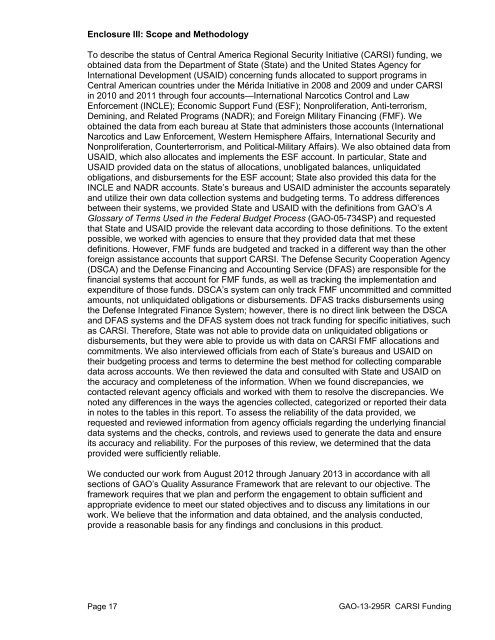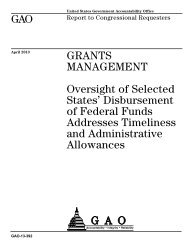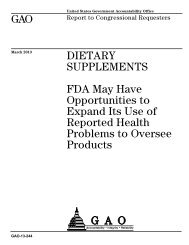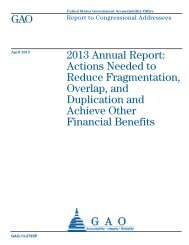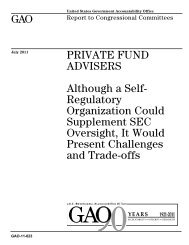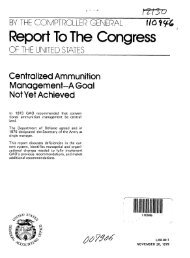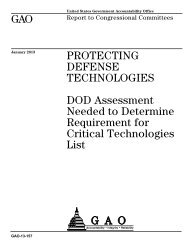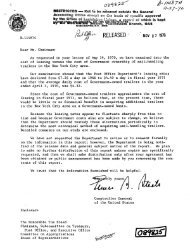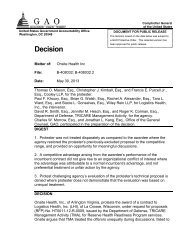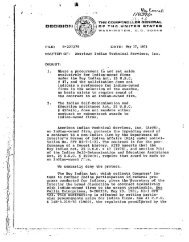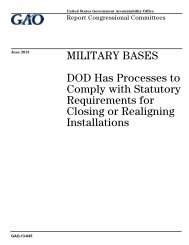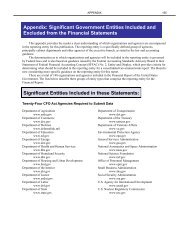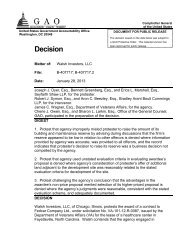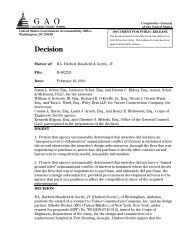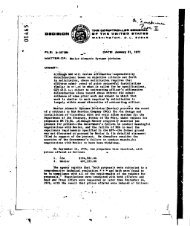Status of Funding for the Central America Regional Security Initiative
Status of Funding for the Central America Regional Security Initiative
Status of Funding for the Central America Regional Security Initiative
You also want an ePaper? Increase the reach of your titles
YUMPU automatically turns print PDFs into web optimized ePapers that Google loves.
Enclosure III: Scope and Methodology<br />
To describe <strong>the</strong> status <strong>of</strong> <strong>Central</strong> <strong>America</strong> <strong>Regional</strong> <strong>Security</strong> <strong>Initiative</strong> (CARSI) funding, we<br />
obtained data from <strong>the</strong> Department <strong>of</strong> State (State) and <strong>the</strong> United States Agency <strong>for</strong><br />
International Development (USAID) concerning funds allocated to support programs in<br />
<strong>Central</strong> <strong>America</strong>n countries under <strong>the</strong> Mérida <strong>Initiative</strong> in 2008 and 2009 and under CARSI<br />
in 2010 and 2011 through four accounts—International Narcotics Control and Law<br />
En<strong>for</strong>cement (INCLE); Economic Support Fund (ESF); Nonproliferation, Anti-terrorism,<br />
Demining, and Related Programs (NADR); and Foreign Military Financing (FMF). We<br />
obtained <strong>the</strong> data from each bureau at State that administers those accounts (International<br />
Narcotics and Law En<strong>for</strong>cement, Western Hemisphere Affairs, International <strong>Security</strong> and<br />
Nonproliferation, Counterterrorism, and Political-Military Affairs). We also obtained data from<br />
USAID, which also allocates and implements <strong>the</strong> ESF account. In particular, State and<br />
USAID provided data on <strong>the</strong> status <strong>of</strong> allocations, unobligated balances, unliquidated<br />
obligations, and disbursements <strong>for</strong> <strong>the</strong> ESF account; State also provided this data <strong>for</strong> <strong>the</strong><br />
INCLE and NADR accounts. State’s bureaus and USAID administer <strong>the</strong> accounts separately<br />
and utilize <strong>the</strong>ir own data collection systems and budgeting terms. To address differences<br />
between <strong>the</strong>ir systems, we provided State and USAID with <strong>the</strong> definitions from GAO’s A<br />
Glossary <strong>of</strong> Terms Used in <strong>the</strong> Federal Budget Process (GAO-05-734SP) and requested<br />
that State and USAID provide <strong>the</strong> relevant data according to those definitions. To <strong>the</strong> extent<br />
possible, we worked with agencies to ensure that <strong>the</strong>y provided data that met <strong>the</strong>se<br />
definitions. However, FMF funds are budgeted and tracked in a different way than <strong>the</strong> o<strong>the</strong>r<br />
<strong>for</strong>eign assistance accounts that support CARSI. The Defense <strong>Security</strong> Cooperation Agency<br />
(DSCA) and <strong>the</strong> Defense Financing and Accounting Service (DFAS) are responsible <strong>for</strong> <strong>the</strong><br />
financial systems that account <strong>for</strong> FMF funds, as well as tracking <strong>the</strong> implementation and<br />
expenditure <strong>of</strong> those funds. DSCA’s system can only track FMF uncommitted and committed<br />
amounts, not unliquidated obligations or disbursements. DFAS tracks disbursements using<br />
<strong>the</strong> Defense Integrated Finance System; however, <strong>the</strong>re is no direct link between <strong>the</strong> DSCA<br />
and DFAS systems and <strong>the</strong> DFAS system does not track funding <strong>for</strong> specific initiatives, such<br />
as CARSI. There<strong>for</strong>e, State was not able to provide data on unliquidated obligations or<br />
disbursements, but <strong>the</strong>y were able to provide us with data on CARSI FMF allocations and<br />
commitments. We also interviewed <strong>of</strong>ficials from each <strong>of</strong> State’s bureaus and USAID on<br />
<strong>the</strong>ir budgeting process and terms to determine <strong>the</strong> best method <strong>for</strong> collecting comparable<br />
data across accounts. We <strong>the</strong>n reviewed <strong>the</strong> data and consulted with State and USAID on<br />
<strong>the</strong> accuracy and completeness <strong>of</strong> <strong>the</strong> in<strong>for</strong>mation. When we found discrepancies, we<br />
contacted relevant agency <strong>of</strong>ficials and worked with <strong>the</strong>m to resolve <strong>the</strong> discrepancies. We<br />
noted any differences in <strong>the</strong> ways <strong>the</strong> agencies collected, categorized or reported <strong>the</strong>ir data<br />
in notes to <strong>the</strong> tables in this report. To assess <strong>the</strong> reliability <strong>of</strong> <strong>the</strong> data provided, we<br />
requested and reviewed in<strong>for</strong>mation from agency <strong>of</strong>ficials regarding <strong>the</strong> underlying financial<br />
data systems and <strong>the</strong> checks, controls, and reviews used to generate <strong>the</strong> data and ensure<br />
its accuracy and reliability. For <strong>the</strong> purposes <strong>of</strong> this review, we determined that <strong>the</strong> data<br />
provided were sufficiently reliable.<br />
We conducted our work from August 2012 through January 2013 in accordance with all<br />
sections <strong>of</strong> GAO’s Quality Assurance Framework that are relevant to our objective. The<br />
framework requires that we plan and per<strong>for</strong>m <strong>the</strong> engagement to obtain sufficient and<br />
appropriate evidence to meet our stated objectives and to discuss any limitations in our<br />
work. We believe that <strong>the</strong> in<strong>for</strong>mation and data obtained, and <strong>the</strong> analysis conducted,<br />
provide a reasonable basis <strong>for</strong> any findings and conclusions in this product.<br />
Page 17<br />
GAO-13-295R CARSI <strong>Funding</strong>


